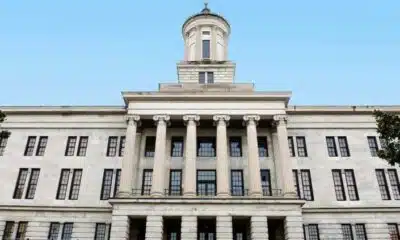News from the South - Texas News Feed
What Texas lawmakers did this session to close workforce gaps
“What Texas lawmakers did this session to close the state’s workforce gaps” was first published by The Texas Tribune, a nonprofit, nonpartisan media organization that informs Texans — and engages with them — about public policy, politics, government and statewide issues.
Sign up for The Brief, The Texas Tribune’s daily newsletter that keeps readers up to speed on the most essential Texas news.
Workforce training played the quiet middle child during this year’s regular legislative session. While louder, more polarizing issues took the spotlight, Texas lawmakers also passed landmark bills that will reshape how students prepare for life after high school.
The session opened with unexpected attention on workforce training when Gov. Greg Abbott made it an emergency item, signaling his desire for lawmakers to treat the issue with urgency at the highest level.
Texas employers have been sounding an alarm: They can’t find skilled workers to do middle-skill jobs like welding and plumbing. The shortage threatens to slow the state’s economy, a point of pride for state leaders. The health care and teacher workforces have also been struggling with persistent vacancies. Expanded career training would help the state meet its goal to get 60% of working-age Texans a postsecondary degree or credential by 2030, which Texas leaders set to fill critical workforce gaps.
The workforce legislation that reached the governor’s desk this session opened new pathways for high school students to access career training and laid the groundwork to build a homegrown nuclear energy workforce. The state’s technical colleges could also see a long-awaited boost to expand their footprint.
High school students will have access to more career support
Under House Bill 20, high school students will soon be able to swap a core academic class — including graduation credit requirements — for a college-level career and technical education course. They’d have to pass end-of-year assessments for courses they’ve taken previously in that subject before making a swap.
Half of Texas students do not enroll in college right after high school, data shows. Rep. Gary Gates, the Richmond Republican who authored the bill, said he wants students who are not interested in college to set off on a path to well-paying jobs earlier. He intends for HB 20 to facilitate more partnerships between high schools and Texas Technical College.
Gates told The Texas Tribune he has tried to pass this bill before. Some critics vocalized their concerns again this session that students who swap out classes will miss out on foundational academic knowledge.
Ultimately, the bill passed with near-unanimous support from legislators. Gates believed that Abbott’s designation of career training as an emergency item gave the bill extra momentum this session.
“It’s one thing to fight me when I’m down here in the cellar,” Gates told the Tribune earlier this session. “But when it became a little bit more higher profile of a bill, they didn’t fight back.”
Students who want to enter the workforce right away will see bolstered career advising. Two pieces of legislation — House Bill 120 and House Bill 2, the Legislature’s $8.5 billion public education funding package — expanded state subsidies for career readiness assessments and explicitly directed school counselors to advise students on career training.
HB 120 also zeroes in on helping students get ready for military service, which the state sees as one of its markers of student success but is often an overlooked career pathway. Student participation in Junior Reserve Officers Training Corps, a high school military training program, will now count toward the state’s career training requirements for school districts.
On top of that, HB 120 triples school districts’ funding — from $50 to $150 — for every student enrolled in a P-TECH, a school where students work toward getting their high school diploma, an associate’s degree and a workforce credential.
An early version of the bill proposed a big investment in college and career advising but that provision did not make it across the finish line.
Two-year colleges get a boost
The two-year-old colleges Texas depends on to get young people ready for the workforce came out of the session with funding wins.
Texans at the November polls will vote on creating an endowment for Texas State Technical College after legislators passed Senate Joint Resolution 59.
Unlike other two-year colleges, Texas State Technical College does not have the authority to raise bonds, and underfunding has led to a halt in critical capital improvements. If voters approve the constitutional amendment, TSTC officials say they will use the money to fix campus infrastructure, upgrade classroom equipment and expand its footprint across the state.
In 2023, a similar piece of legislation made it through the Legislature, but was among the slew of vetoes Abbott made to signal his disappointment on property tax negotiations. The funding boost for technical colleges almost got caught in political crosshairs again this year when House Democrats threatened to shoot down all constitutional amendments over school vouchers.
The Legislature also revisited the funding formula for community colleges, which they overhauled in 2023 to move away from enrollment as a measure of success and instead incentivize student degree and credential completion. This session, they aimed to connect more Texans to higher education.
Under Senate Bill 1786, community colleges will receive funds when their students transfer to private universities, not just public ones. This will help schools like McLennan Community College, which has a strong pipeline of students who transfer to Baylor University next door.
SB 1786 also narrows the definition of a “credential of value,” tying it more closely to wage-related returns on investment for students and to labor market needs.
In addition, the bill expands the FAST grant, which waives the cost of dual credit courses for low-income students. High school students who qualify for free and reduced lunch at any time in the school year and students in the Windham School District, the high school education system in Texas prisons, will now qualify for the grant.
Finally, the bill calls for stronger coordination between the Texas Workforce Commission, the Texas Higher Education Coordinating Board and the Texas Education Agency when giving out career and technical education grants.
Growing apprenticeship programs and Texas’ nuclear industry
Political momentum behind apprenticeships has been growing. The earn-while-you-learn model is seen as a win-win: Young people can start making money right away instead of waiting to complete their degree, and workforce leaders get to fill vacancies and reverse their critical Texas-sized shortages.
In 2019, the Legislature seized that momentum, establishing an apprenticeship grant to incentivize employers to grow and create work-based learning programs.
But program growth stagnated because of a mismatch in state law and federal policy. The 2019 law required apprenticeship programs to get approval from the U.S. Department of Labor. Meanwhile, the federal agency ceased action on this type of program in recent years. TWC’s hands were effectively tied and couldn’t take advantage of the grant.
House Bill 3260 modifies state law to allow TWC to grow the program without dependence on the U.S. Department of Labor.
Texas lawmakers are also developing the worker pipeline for an emerging energy sector. As hopes build for Texas to lead the way in advanced nuclear energy, Sen. Judith Zaffirini, D-Laredo, zeroed in on training young people around the state to carry out nuclear-grade welding and radiological monitoring.
Senate Bill 1535 directs the Texas Workforce Commission to create an advanced nuclear workforce development program. The workforce agency would determine curriculum requirements for degree programs that would meet industry needs.
The Texas Tribune partners with Open Campus on higher education coverage.
Disclosure: Baylor University has been financial supporters of The Texas Tribune, a nonprofit, nonpartisan news organization that is funded in part by donations from members, foundations and corporate sponsors. Financial supporters play no role in the Tribune’s journalism. Find a complete list of them here.
Big news: 20 more speakers join the TribFest lineup! New additions include Margaret Spellings, former U.S. secretary of education and CEO of the Bipartisan Policy Center; Michael Curry, former presiding bishop and primate of The Episcopal Church; Beto O’Rourke, former U.S. Representative, D-El Paso; Joe Lonsdale, entrepreneur, founder and managing partner at 8VC; and Katie Phang, journalist and trial lawyer.
TribFest 2025 is presented by JPMorganChase.
This article originally appeared in The Texas Tribune at https://www.texastribune.org/2025/06/24/texas-workforce-training-legislative-session/.
The Texas Tribune is a member-supported, nonpartisan newsroom informing and engaging Texans on state politics and policy. Learn more at texastribune.org.
The post What Texas lawmakers did this session to close workforce gaps appeared first on feeds.texastribune.org
Note: The following A.I. based commentary is not part of the original article, reproduced above, but is offered in the hopes that it will promote greater media literacy and critical thinking, by making any potential bias more visible to the reader –Staff Editor.
Political Bias Rating: Center-Right
This article presents workforce training legislation in Texas with a generally positive and pragmatic tone, emphasizing economic growth, skills development, and practical solutions to labor shortages. It highlights support from Republican Governor Greg Abbott and Republican Representative Gary Gates while acknowledging bipartisan cooperation. The framing focuses on workforce readiness, career and technical education, and boosting community colleges, aligning with a policy perspective that values market-driven workforce development and state-led initiatives. The language is measured and factual, avoiding overt ideological language but leaning toward a conservative, pro-business viewpoint emphasizing economic competitiveness and pragmatic governance.
News from the South - Texas News Feed
Abrego Garcia released from prison, headed to family
SUMMARY: Kilmar Abrego Garcia, wrongfully deported and imprisoned, has been released from a Tennessee jail and is en route to Maryland to reunite with his family, his lawyer Sean Hecker confirmed. Abrego Garcia was deported in March due to an “administrative error” and faced federal human smuggling charges related to a 2022 Tennessee traffic stop. His attorneys argue the prosecution is vindictive and selective, citing violations of his due process rights. A 2019 immigration ruling bars his return to El Salvador, and ICE is restricted from immediate custody post-release. The case continues amid concerns over potential re-deportation.
The post Abrego Garcia released from prison, headed to family appeared first on www.kxan.com
News from the South - Texas News Feed
Texas Senate expected to take up GOP congressional map
“Texas Senate expected to take up GOP congressional map, last stop before Abbott’s desk” was first published by The Texas Tribune, a nonprofit, nonpartisan media organization that informs Texans — and engages with them — about public policy, politics, government and statewide issues.
Sign up for The Brief, The Texas Tribune’s daily newsletter that keeps readers up to speed on the most essential Texas news.
The Texas Senate on Friday was expected to consider a new congressional map gerrymandered to maximize Republican representation, putting the plan on a path to the governor’s desk after weeks of intense partisan clashing.
Republican lawmakers were poised to push the map through over fierce Democratic opposition, launching a national redistricting war from Albany to Sacramento while positioning the GOP to net up to five additional seats in Texas.
The map, demanded by President Donald Trump to fortify the GOP’s U.S. House majority in next year’s midterm election, would hand up to five additional U.S. House seats to Republicans by dismantling Democratic bastions around Austin, Dallas and Houston, and by making two Democrat-held seats in South Texas redder. The new lines would also keep all 25 seats already held by Republicans safely red.
The pickups are meant to help the GOP hold onto its razor-thin congressional majority in a midterm election year that is expected to favor Democrats — potentially making the difference between a continued Republican trifecta in Washington, or a divided government with one chamber intent on investigating Trump and bottlenecking his agenda.
That has put Texas lawmakers at the front lines of an issue with national stakes. Republicans earned kudos from Trump for pushing the new boundaries through the state House, while Democrats won support from national party figures, including former President Barack Obama, Democratic National Committee Chair Ken Martin and U.S. House Minority Leader Hakeem Jeffries of New York.
Though congressional lines are typically redrawn once every 10 years following the decennial census, Republicans justified the aggressive and unusual move to do so in the middle of the decade by saying it was legal to craft new boundaries at any point and for purely partisan gain. They also pointed to the party’s margins of victory in 2024 and the need to counter blue-state gerrymandering to further support their push.
The U.S. Supreme Court ruled in 2019 that states can draw electoral maps on partisan grounds. But under Section 2 of the Voting Rights Act, the lines cannot diminish people’s voting power based on race.
Democrats argued that the new map would increase Republicans’ advantage by unconstitutionally suppressing the vote of Black and Latino Texans. They framed the push as a power grab by Trump meant to stack the deck in next year’s election.
Texas’ anticipated approval of the map has set off a tit-for-tat redistricting push in California, where Gov. Gavin Newsom has proposed a map voters would have to approve that could yield five new Democratic-leaning seats, effectively offsetting GOP gains in Texas. Other blue-state governors and national Democratic leaders are backing retaliatory gerrymandering as the Trump administration also pushes GOP-controlled Florida, Indiana, Missouri and Ohio to draw more red seats.
The new Texas map cleared its biggest hurdle Wednesday when, after more than eight hours of tense debate, the state House adopted the plan along party lines.
Lacking the votes to stop the map in the GOP-dominated Texas Legislature, more than 50 House Democrats staged a two-week walkout earlier this month, grinding the lower chamber to a halt by denying the quorum needed to conduct business.
Republicans unleashed an unprecedented response to drag them back to Texas, issuing civil arrest warrants, asking a court to extradite them from Illinois, seeking to declare over a dozen Democrats’ seats vacant and clamoring for legislative punishments upon their return.
After most Democratic lawmakers returned to Austin Monday, Republican Speaker Dustin Burrows, seeking to maintain a quorum, required each of them to agree to a police escort to leave the Capitol building. Rep. Nicole Collier, D-Fort Worth, refused and was confined to the Capitol for the next 54 hours, prompting a national media frenzy.
Democrats portrayed the walkout as a victory for sparking a national movement in support of retaliatory redistricting, and as just the first part of a longer fight against the map. In the House on Wednesday, Democratic lawmakers pressed their Republican colleagues on the plan’s impact on voters of color, working to establish a record they could use in a legal challenge seeking to kill the lines before next year’s election.
“This fight is far from over,” Rep. Gene Wu of Houston, chair of the House Democratic Caucus, said after the map’s passage in the lower chamber. “Our best shot is in the courts. This part of the fight is over, but it is merely the first chapter.”
More all-star speakers confirmed for The Texas Tribune Festival, Nov. 13–15! This year’s lineup just got even more exciting with the addition of State Rep. Caroline Fairly, R-Amarillo; former United States Attorney General Eric Holder; Abby Phillip, anchor of “CNN NewsNight”; Aaron Reitz, 2026 Republican candidate for Texas Attorney General; and State Rep. James Talarico, D-Austin. Get your tickets today!
TribFest 2025 is presented by JPMorganChase.
This article originally appeared in The Texas Tribune at https://www.texastribune.org/2025/08/22/texas-congressional-redistricting-map-senate-governor-desk/.
The Texas Tribune is a member-supported, nonpartisan newsroom informing and engaging Texans on state politics and policy. Learn more at texastribune.org.
The post Texas Senate expected to take up GOP congressional map appeared first on feeds.texastribune.org
Note: The following A.I. based commentary is not part of the original article, reproduced above, but is offered in the hopes that it will promote greater media literacy and critical thinking, by making any potential bias more visible to the reader –Staff Editor.
Political Bias Rating: Center-Left
The article focuses on the Texas congressional redistricting map, highlighting its Republican origins and the partisan conflict it has sparked. It provides detailed coverage of Democratic opposition and criticisms, including concerns about voter suppression among minority groups, and frames Republican efforts as a “power grab” led by Trump. The inclusion of national Democratic figures’ support for opposition and the emphasis on Democratic strategies and responses suggest a slight lean toward a Center-Left perspective. However, the article maintains a measure of balance by covering Republican justifications and legal points, which keeps it from tilting strongly left or right.
News from the South - Texas News Feed
Dinosaur teeth reveal secrets to Earth's past, UT study finds
SUMMARY: A University of Texas study analyzed dinosaur teeth fossils from the late Jurassic period to uncover their diets and behaviors. Paleontologist Liam Norris examined calcium isotopes in teeth from herbivores like Diplodocus, Camarasaurus, and Camptosaurus, revealing varied feeding habits such as ground-level and canopy browsing, with each species targeting different plants to coexist. Carnivores like Allosaurus mainly consumed flesh, avoiding bones, while Eutretauranosuchus likely ate fish. The research shows dinosaurs couldn’t chew but swallowed food whole, aiding new understanding of ancient ecosystems. This study enriches paleontology, offering deeper insights into dinosaur life and evolution.
The post Dinosaur teeth reveal secrets to Earth's past, UT study finds appeared first on www.kxan.com
-
News from the South - Texas News Feed5 days ago
New Texas laws go into effect as school year starts
-
News from the South - Florida News Feed5 days ago
Floridians lose tens of millions to romance scams
-
News from the South - Kentucky News Feed6 days ago
AmeriCorps is under siege. What happens in the communities it serves?
-
News from the South - Florida News Feed6 days ago
Protesters go on strike in Israel demanding ceasefire and release of Gaza hostages
-
News from the South - West Virginia News Feed5 days ago
Religious exemption debate front and center amid new school year in WV
-
News from the South - Alabama News Feed5 days ago
Final steel girders placed on new Gulf Shores bridge, completion on track
-
News from the South - Missouri News Feed7 days ago
Three months since St. Louis tornado: How long will cleanup take?
-
News from the South - Tennessee News Feed6 days ago
Son hopes to get emergency visa following mother's death in East Tennessee














































